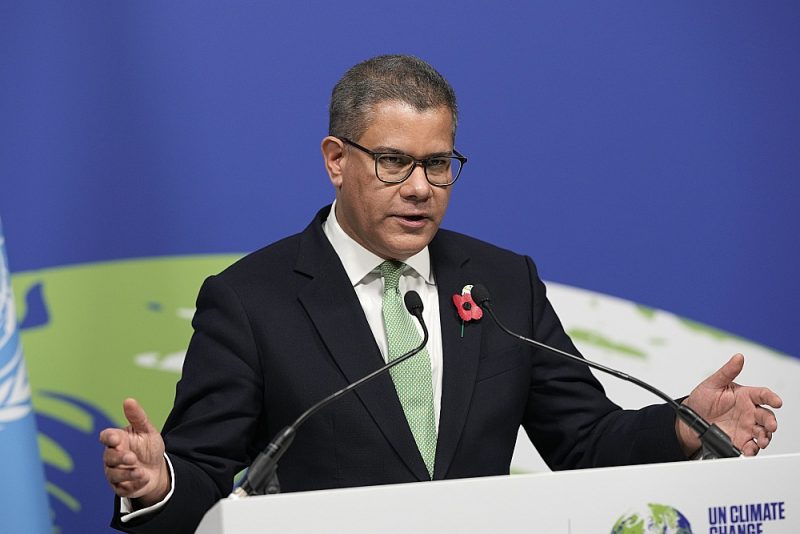
The emotional tension in the Glasgow talks to reach an agreement on curbing global warming is evidenced by the fact that at the end of the conference, its chairman, British politician Alok Sharma, was close to tears.
Foto: Alastair Grant/AP/SCANPIX
Valdis Bērziņš, “Latvijas Avīze”, JSC “Latvijas Mediji”
The United Nations Climate Change Conference (COP26) in Glasgow has concluded an agreement that, for the first time, eradicating fossil fuels as a key objective in the fight against global warming, but has been opposed at the last minute by coal-dependent countries.
A difficult compromise in a 197-country forum
–
The news
Streips: A person who is so close to a disability that the vaccine becomes a deadly threat to him is probably not someone to be entrusted with leading our country.
13 hours
–
Cocktail
You today you will be able to cope with practically any task and situation! Horoscopes for November 15th
13 hours
–
The news
What services will be available without a Covid-19 certificate from Monday?
2 days
–
The agreement reached in Glasgow is the first climate plan to limit the use of the most harmful coal. However, the promises made in Glasgow are not far-reaching enough to limit global temperature rises to 1.5 degrees.
Although the agreement has already been praised for maintaining its goal of limiting global warming to 1.5 degrees Celsius, many of the nearly 200 national delegations make no secret of the fact that they had hoped for more. The Glasgow Conference has made progress in defining the rules for the so-called carbon market, but the demands of poor countries to increase funding to tackle the effects of climate change have received little response.
At the last minute, India, backed by China and other coal-dependent countries, rejected a clause calling for the “elimination” of coal for electricity generation. Following consultations between India, China, the United States and the European Union, the term “eradicate” was hastily replaced by “sharply restrict”.
Both rich European countries and small island states were reluctant to change, but critics agreed to sign a compromise agreement.
COP26 President Alok Sharma said with deep tears that he was deeply saddened by the last-minute forced concessions, but added that it was very important to keep the agreement as a whole. On the issue of financing poor countries, a pledge was made from rich countries to double the amount of financial support by 2025 compared to 2019. The UN committee will report next year on the progress made in fulfilling the rich countries’ pledge of $ 100 billion annually to poor countries in 2020. Countries are expected to return to the issue of financial support in 2024 and 2026.
UN Secretary-General: “The world is hanging by the end”
The host of the conference, the Prime Minister of the United Kingdom Boris Johnson, has expressed hope that “the world will be able to look back at the COP26 conference in Glasgow as the beginning of the end of climate change”.
He acknowledged that much remains to be done in the coming years, but the conference is a major step forward, with the first international agreement to drastically limit coal use and a roadmap to limit global warming to 1.5 degrees. The US climate ambassador, John Kerry, said it would be unrealistic to hope that a decision would be made at the Glasgow summit to end the climate crisis, but there was a “starting shot” on the way.
UN Secretary-General Antoniu Guteres, who tirelessly urged representatives of 197 member states to make the conference a success, acknowledged on the last day that “the world is hanging by the end”. “We are still knocking on the door of a climate catastrophe. It is time to turn on the emergency mode – will our chance of achieving zero emissions itself be zero, ”he said.
The most intense debate was on limiting the use of coal, which accounts for around 40% of carbon emissions. Achieving the goal set at the Paris Climate Conference in 2015 requires a 45% reduction in carbon emissions by 2030 and almost zero by the middle of the century.
Member States agreed to meet next year to achieve further reductions in carbon emissions with a view to reaching a global warming limit of 1.5 degrees. If the promises made in Glasgow are kept, global warming will only be limited to around 2.4 degrees. At the end of the conference, Swiss Environment Minister Simoneta Sommaruga expressed disappointment that the final document relaxed the requirements for coal use and fossil fuel subsidies, as this would make it more difficult to reach the 1.5 degree target.
“They changed their name in the final document, but they cannot change the message of the Glasgow conference: the coal era is coming to an end,” said Jennifer Morgan, executive director of Greenpeace.
Themes
–


